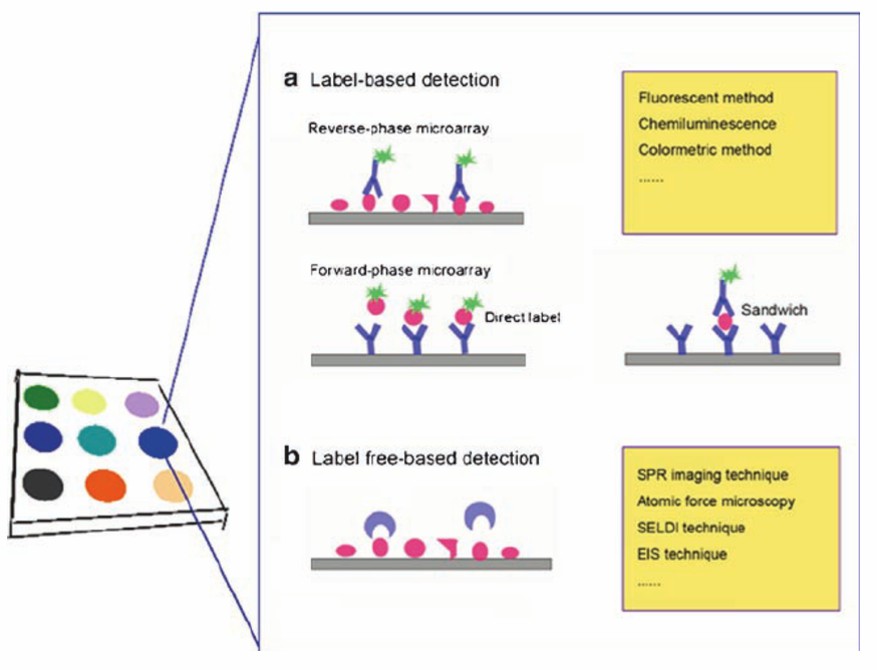Protein microarray is a powerful assay system that contains hundreds of molecules on one plate, including cytokines, phosphatases, receptors, and other proteins, which enables the characterization of hundreds of thousands of proteins in a highly parallel and high-throughput manner.
ELISA has always been the most classic method to detect protein content, but when multiple factors of multiple samples need to be detected, the traditional ELISA appears to be unable to cope with it. Protein microarrays, on the other hand, enable multi-factor detection of multiplexes, which are high-throughput protein detection methods that can be used for protein expression profiling, studying protein-protein interactions, even DNA-protein and RNA-protein interactions, screening protein targets for drug action, etc.
Our High-density Protein Array
To facilitate your research, Creative Proteomics offers high-density microarrays for you to detect thousands of unique full-length proteins simultaneously.
We provide various of protein microarrays: analytical, functional, and reverse-phase protein microarrays and antibody microarrays. Our protein microarrays can be used with all types of liquid samples, such as cell culture supernatants, cell lysates, tissue lysates, plasma, and serum. Some of the products are also suitable for frozen or FFPE tissue lysates.
Our products are used for (not limited to):
- Detection of protein binding properties
- Identification of protein post-translational modifications
- Biomarker Identification and validation
- Pathogen–host interactions research
- Key factors screening
- Confirmation of biological processes
- Validation of antibody array results
- Comparing normal, diseased, or treated sample profiles
Our Product List
If the product you need is not in the list below, please contact us
1. Proteome Array
2. Phospho Protein/Antibody Arrays
3. Antibody Microarrays for Protein Expression Levels Detection
4. Cytokine Array
Main Advantages of Protein Microarrays
- High throughput: high throughput parallel analysis of thousands of target proteins can be achieved on protein assays.
- Minimal sample volume required (10-100 μl).
- Fast, miniaturized and automated.
- High signal-to-noise ratio, high accuracy, high sensitivity (monoclonal antibodies).
- Directly link DNA sequence information to protein products at the whole genome and proteome level. The next step in the development of protein microarrays is the ability to analyze the entire proteome, that is, to arrange at least 5,000 to 10,000 proteins on a single assay.
- Quantitative detection can be performed by standard curve.
Principle of Protein Array
Various proteins are sequentially immobilized on various carriers such as titration plates, filter membranes and slides. Then, proteins or other components labeled with a specific fluorescent light interact with the microassay, and components that fail to bind to the target protein on the microassay are washed away. The fluorescence intensity of each point on the microassay is then measured using a fluorescence scanner or laser confocal scanning technique to analyze the protein-protein interactions and thus achieve the purpose of measuring various proteins.
The proteins immobilized on the microarray can be: antibodies, small peptides, antigens, receptors and ligands, protein-DNA and protein-RNA complexes, etc.
And antibody microarray is the main type of protein microarray, which is a branch of protein microarray research with rapid progress.
 Principles of protein microarray detection strategies
Principles of protein microarray detection strategies
According to the application protein microassay can be classified:
1. Protein detection microassay: immobilize probe molecules (such as monoclonal antibodies) with high affinity specificity on a substrate for identifying target proteins/peptides in complex biological samples.
2. Protein function microassay: natural protein are added on the substrate to understand which protein in the system can bind to a known protein, and it is used for natural protein activity and molecular affinity research.
* This product is For Research Use Only. Do Not use in diagnostic or therapeutic procedures.

 Principles of protein microarray detection strategies
Principles of protein microarray detection strategies